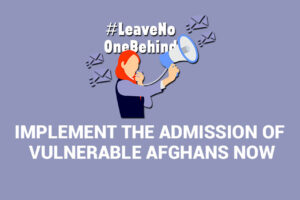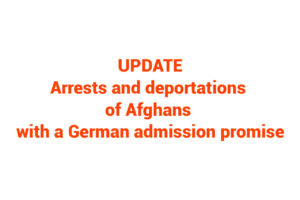
Since the Taliban’s takeover in 2021, the humanitarian and human rights situation in Afghanistan has drastically deteriorated. Particularly women* and minorities suffer under the brutal rule that has largely stripped them of their rights. Inadequate food supply, lack of access to education – especially for girls* – and insufficient healthcare characterize the situation in the country.
The number of Afghan asylum seekers in Germany has significantly increased since 2021. By 2024, more than 420,000 Afghans lived here. The Afghan diaspora has been in Germany for decades in some cases, and is an integral part of neighborhoods, schools, universities, associations, and the workforce. The Afghan community is part of Germany.
The reception of Afghan refugees is often politically and media-wise discussed in an undifferentiated manner. The German government now plans to discontinue humanitarian reception programs such as the Federal Reception Program for Afghanistan and to push for deportations to the country. However, reception remains urgently necessary. Therefore, we demand:
Ensure Safe Reception
The catastrophic situation in Afghanistan requires targeted protection measures for particularly vulnerable individuals. Germany must take a leading role here, especially as many German institutions have been active in Afghanistan for years.
Continue Reception Programs:
People who have worked for democracy and human rights with German support are now at risk. They may have a legal claim to be rescued. The Federal Reception Program and other pathways to reception must remain in place – and all vulnerable family members must be considered. Civil society should be more involved in planning and implementation; long-term funding must be ensured.Enable Resettlement from Neighboring Countries:
Afghans represent the second-largest group worldwide in need of resettlement. Resettlement offers a standardized reception process at the EU level that provides protection to particularly vulnerable people and contributes to a more balanced responsibility-sharing in global refugee protection by supporting first countries of asylum. Additionally, resettlement is funded through the European Asylum, Migration, and Integration Fund (AMIF).Strengthen Family Reunification:
The closure of the German embassy in Kabul has made family reunification significantly more difficult. The waiting times at the German embassy in Iran are over two years, and in Pakistan, it is about one year. There is an urgent need for more processing capacity at these embassies. The processing of family reunification applications in Germany must also be increased. Afghan women who have no access to education in Afghanistan should be exempt from the requirement for German language acquisition. National reception programs can enable Afghans living in Germany to reunite with their relatives.
Provide Actual Protection in Germany
Despite the dramatic situation in Afghanistan, the number of rejected asylum applications in Germany is rising. Meanwhile, the humanitarian situation in Afghanistan continues to worsen – partly due to cuts in international aid and deportations from neighboring countries.
Protection in the Asylum Procedure:
Afghans have a right to protection in Germany. The situation in their home country is so precarious that they risk torture, inhuman treatment, or destitution upon return. Accordingly, subsidiary protection or a ban on deportation should always be granted – and refugee status in cases of individual persecution by the Taliban. Women are – as the European Court of Justice also determined – specifically persecuted as a social group in Afghanistan.No Deportations to Afghanistan:
Article 3 of the European Convention on Human Rights prohibits deportations if torture and inhuman treatment are threatened. This danger exists in Afghanistan. Deportations to Afghanistan therefore violate the international ban on deportation. Furthermore, regular deportations would foreseeably require the establishment of diplomatic relations with the Taliban.Genuine Opportunities for Residence:
Around 10,000 Afghans in Germany only have a temporary stay. They need reliable options for residence and better integration opportunities instead of years of uncertainty.
Facilitate Arrival and Participation
Germany must create dignified reception conditions and strengthen integration measures. German politics and civil society have already gained valuable experience in the areas of education and labor market integration and achieved successes. This offers the opportunity to support Afghan immigrants in their arrival and participation – and to promote their social and civil integration through integration measures.
Support Afghan Diaspora Organizations:
These organizations are crucial contact points for newcomers and can serve as a link between the Afghan community, other civil society organizations, and politics. They urgently need support and should be more involved.Facilitate Labor Market Integration:
Many Afghans have academic and professional qualifications and are interested in further education in Germany. Access to work, training, and apprenticeships will help them integrate into society and contribute to the German economy. For this, their stay must be secured and employment allowed.Ensure Access to Discrimination-Free Education:
Children need early access to daycare and schools. Barriers must be removed, and educational professionals must be trained for diversity to provide children with fair opportunities for an equal future.
Signatory Organizations (alphabetically, as of May 15, 2025):
Afghan Stammtisch Schleswig-Holstein
AWO Federal Association e.V.
Refugee Council Berlin e.V.
Refugee Council Schleswig-Holstein e.V.
Kabul Airlift
Sponsorship Network Local Staff e.V.
PRO ASYL Federal Working Group
Afghan Organizations Association in Germany e.V. (VAFO)





